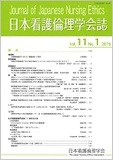Japanese
English
- 販売していません
- Abstract 文献概要
- 参考文献 Reference
- サイト内被引用 Cited by
本研究の目的は、臨地実習を含む4年間の看護基礎教育の中で看護大学生が倫理的に問題だと感じた場面と対応を明らかにすることである。研究協力を得た12名の学生を対象にフォーカスグループ・インタビューを用いてデータを収集した。分析の結果、7つの場面【安易に行われている身体拘束】【患者の意思に反した対応】【患者の尊厳が十分に尊重されていない医療職者の対応】【公正でない医療職者の言動】【守秘義務や個人情報保護に対する意識の欠如】【未熟な処置やケアの実施】【患者の気持ちを優先】が明らかとなった。倫理的問題に気が付いた時の対応では、他者へ相談するなど倫理問題の客観視・問題解決に向けたプロセスに向かうことができた学生は1割のみであった。学生は何が倫理的問題に気が付く能力はあるもののそれを客観的に分析する能力が未熟であることが示唆された。
This study aimed to clarify situations in which nursing university students experienced ethical issues during a four-year nursing course, including practice. In addition, it aimed to clarify the students' response to such ethical problems. We collected data using focus group interviews with 12 students who consented to participate. Results of our analysis revealed the following seven situations in which students experience ethical issues: “physical restraint without prudent assessment,” “Nursing care against the patient's intention,” “Correspondence of the healthcare worker without respecting the dignity of the patient,” “Unfair behaviors of healthcare professionals,” “Lack of awareness about maintaining confidentiality,” “Implementing unripe measures and care,” and “Prioritizing patients' feelings.” When dealing with ethical issues, only 10% of the students were able to progress to a process of viewing the situation objectively and solving the problem by using methods such as consultation with others. Students suggested that, although they can notice ethical problems, their ability to analyze them objectively is inadequate.
Copyright © 2019, The Japan Nursing Ethics Associatin. All rights reserved.


